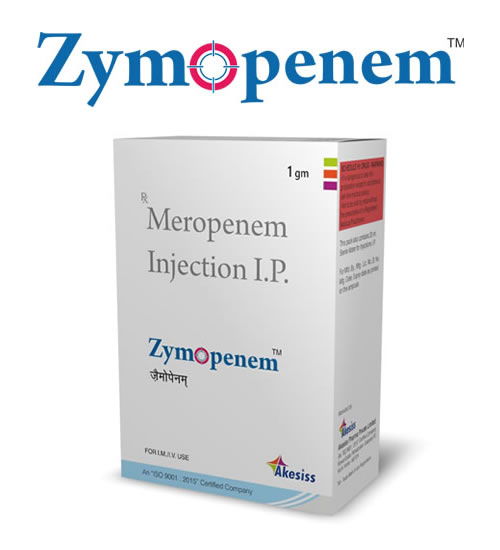COMPOSITION:
Meropenem 1gm inj.
Zymopenem injection is a sterile, pyrogen-free, synthetic, broad-spectrum, carbapenem antibacterial for intravenous administration.
MECHANISM OF ACTION:
Cause rapid bacterial cell death by covalently binding to penicillin-binding proteins (PBPs) involved in the biosynthesis of mucopeptides in bacterial cell walls. Bactericidal effects result through inhibition of cellular growth and division and the loss of cell wall integrity, eventually causing cell wall lysis. The primary target is PBP 2.
PHARMACOKINETICS:
Distribution and Tissue Penetration:
Meropenem appears to be widely distributed in tissues, with the steady-state volume of distribution in healthy adult volunteers ranging from 12.5 to 20.7 L. The extent of protein binding is very low. In animal studies, it was shown that meropenem is widely distributed to most organs, with the highest concentrations achieved in the kidney, blood, and urine.
Metabolism:
Metabolism of meropenem is responsible for between 19% and 27% (table 1) of the plasma clearance of the drug. There is no need to combine meropenem with a dehydropeptidase inhibitor to achieve high urinary concentrations of meropenem.
Excretion:
Meropenem is primarily excreted in the urine, with negligible fecal excretion. About 70% of meropenem is cleared via the kidneys, with the remainder of the drug being cleared by metabolism to the ring-open lactam. Both meropenem and its microbiologically inactive metabolite are excreted via the kidneys. Pharmacokinetic studies have shown that 65%-79% of the drug is excreted as meropenem and 19%-27% is excreted as the ring-open lactam.
Pharmacodynamics:
The broad-spectrum antibiotic meropenem shows a high probability of attaining its bactericidal and bacteriostatic pharmacodynamic targets in numerous applications, with standard dosing regimens
Side effects:
The most common adverse effects are diarrhea (4.8%), nausea and vomiting (3.6%), injection-site inflammation (2.4%), headache(2.3%), rash (1.9%) and thrombophlebitis (0.9%).
CONTRAINDICATIONS:
Clostridium difficile infection, Decreased Blood Platelets, Lesion of the Brain, seizures, chronic kidney disease stage 4 (severe), chronic kidney disease stage 5 (failure), kidney disease with likely reduction in kidney function
INTERACTIONS:
Tell your doctor about all the medicines you take including prescription and non-prescription medicines, vitamins, and herbal supplements. Especially tell your doctor if you take:
- probenecid (Probalan): meropenem iv increases levels of probenecid oral by reducing drug removal from the body.
- valproic acid : Administration of concomitant VPA with carbapenem antibiotics can result in subtherapeutic levels of VPA.


